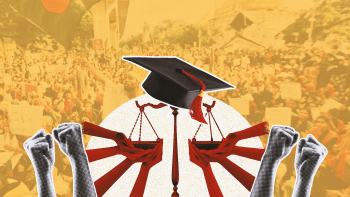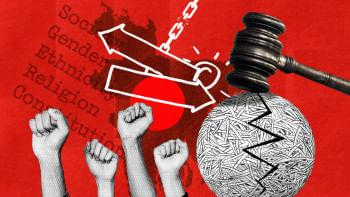A ‘new’ constitution and our obsession with texts

Since the fall of the Sheikh Hasina regime, I have been raising concerns about why a new constitution may not be helpful in bringing in or restoring the culture of constitutionalism for us. The concerns that I have about drafting a new constitution are twofold: one is with respect to the process, and the other is regarding the substance. I use examples primarily from the Global South to substantiate my arguments because, as modern studies in constitutionalism suggest, comparing inherently dissimilar cases with dissimilar politico-constitutional culture and history can provide essentially fallacious and problematic conclusions.
With respect to the substance, a major worry around drafting a new constitution is whether we can duly accommodate the non-dominant identitarian elements therein. Indeed, constitution-making can usher in a rather zero-sum game if the non-dominant voices are not accommodated, which, as per scholars, is the primary purpose of any constitution, particularly in "divided societies." One may say we ought to get rid of the identitarian elements (e.g. secularism, nationalism) altogether, but whether that would really solve our deep-seated ideological conflicts sustainably is an important question to ask. Because, in divided societies, different factions need "constitutional insurance," and getting rid of the identitarian elements altogether may potentially create an insurance deficit.
More importantly, the constitution-making episode cannot—and normatively, should not—be viewed as a "defining moment" to potentially solve all our ideological crises and identitarian problems at once. The idea is to take a rather incremental approach in defining and contesting the identities that define a polity, as the democratic spaces broaden, and as electoral processes smoothly function. An incremental evolutive process can even transform apparently rigid identities into overarching values or inclusive constitutional norms to abide by. We have not experienced such an incremental evolution due to the lack of a sustained democratic culture with an independent higher judiciary at its guard.
Regarding the process, we can all agree on principle that a new constitution should come through an elected constituent assembly, if at all. Some argue in favour of first drafting a constitution (perhaps through inter-party consultations) and then going for a referendum. This, in my opinion, will not be a truly democratic and participatory process. Such a referendum, with perhaps simple yes-no questions, will leave all the contested questions unsolved. Without the scope for debating or interrogating the areas that impact the lived experiences of the minorities, such referendums will only bring in acontextual majoritarian results. In many jurisdictions of the Global South (e.g. parts of Latin America, Africa), referendums have been abused and manipulated over the years only to suit the needs of parties in power. A referendum, however, can be useful in deciding whether or not to go for a new constitution-making episode.
In any case, a major worry around the process of constitution-making is whether all stakeholders can duly be made part of it. Negotiating a new constitution can re-enforce divisions, entrench schisms, and lead to further conflicts. In recent times, constitution-making processes have been unsuccessful at various levels across jurisdictions (e.g. Fiji, Yemen, and Myanmar, to name a few). One of the most prominent examples of a "successful" constitution-making episode is that of Nepal, although we need to critically interrogate the success Nepal experienced. The drafting process in Nepal began in 2006 and ended in 2015; in the meantime, it experienced wanton violence and enormous ethnic conflicts throughout the country. In the context of modern constitution-making, it has been empirically proven that unless constitution-making processes are unilateral, they are virtually never smooth in divided societies.
Furthermore, while making a constitution is certainly not a one-off business, its outcome is expected to survive for a substantive period. While we ask what political insurance there would be that a democratically elected government will bring in required constitutional reforms, we forget to ask what political insurance there is that even a new constitution will survive and not backslide. Will it survive only because it is new? Given the political culture in Bangladesh, it is imperative to articulate the exact political insurance that will undergird a new constitution. Because otherwise, as was the case with constitutional amendments, we can very conveniently slide into the culture of making new constitutions too. Helpful to know, in some parts of the Latin Americas, Asia and Africa, making new constitutions has emerged as rather a political amusement, with political parties wanting to make a new constitution if/when it suits them.
A major issue with our current constitution is thought to be the basic structure doctrine. It is argued that whatever changes are made to the existing constitution may be declared unconstitutional by the court on the ground that they violate its basic structure. In my opinion, it is not the basic structure doctrine that is problematic, rather the way it has evolved in our jurisdiction. Normatively speaking, basic structure is a useful counter-majoritarian tool, with the judiciary working as a neutral arbiter against the tendencies of albeit authoritarian parliaments in amending the constitution. Basic structure should, in fact, be imagined as a value-laden tool—certain principles undergirding constitutionalism, liberal democracy, and the idea of a limited government should be viewed as the basic structure (e.g. separation of powers, rule of law, independence of judiciary) and not what the text says.
But we have always been obsessed with text—be it as judiciary, as legislature, or even as academia. Our apex court first viewed the "unitary character" of the state as part of the basic structure of the constitution to hold as unconstitutional a constitutional amendment decentralising the High Court Division. The court, however, did not substantiate how the "unitary character" of the Supreme Court benefits or impinges on liberal democracy or the culture of constitutionalism. But many in the academia celebrated that as basic structure only because the text backs such a hypothesis. Interestingly, in certain contexts, the federal structure of a state can be thought to be part of "liberal democracy" when autonomous state units or federal devolution of powers is a politico-historic contingency and is inherently connected with distinct peoples' civil-political rights (e.g. Spain, India). However, holding as unconstitutional the decentralisation of the High Court Division based on the "unitary character" of the state, without establishing its relationship with constitutionalism or democracy, only manifested a rather imprecise, textualist reading on the part of the judiciary. A value-based, rather than text-based, approach to reading and applying (or not applying) the basic structure doctrine can certainly protect amendments deemed essential to benefit constitutionalism.
Our parliament, on the other hand, drafted a self-defeating provision, Article 7B, by declaring one-third of the text of the constitution as unamendable through the usual constitutional amendment process. Article 7B was not brought by the original/primary constituent power (i.e. it was not part of the original constitution) and not through any referendum either. Just because 7B says that it is unamendable, it does not miraculously become unamendable. Similarly, a special process (such as referendum) does not automatically become a requirement for getting it amended. I see Article 7B both as easily amendable and as unconstitutional. Indeed, I may say that a provision like 7B defeats the basic structure of any democratic constitution, which should, by its very nature, be evolutive. Indeed, the only exception for such evolution should be principles that undergird the sustenance of a liberal democratic polity. Also, for those who only worry that new amendments may be declared unconstitutional by the court, in South Africa, even the new constitution was declared unconstitutional by the court for not conforming with the principles as negotiated earlier.
In a bid to get rid of the basic structure doctrine, we may argue for stricter methods of constitutional amendment. But would that be helpful too? When democratic erosion or backsliding is the norm, even rigid amendment processes do not help. Because parties in power may always find a way to manipulate such rigidity. Unsurprisingly, of course, making a new(er) constitution to bypass the rigidity of the older one (the one we draft now) will be a genuine political possibility. In fact, bypassing the rigidity can even manifest as the sole reason to make a new(er) constitution.
Furthermore, a rigid method of constitutional amendment is particularly problematic for the fringe-dwellers (e.g. women, Indigenous peoples, and other such minorities) who rather have to map their position within the constitutional landscape in and through constant contestations. Take, for instance, the 19th constitutional amendment (recognising voting rights of women) in the US that literally, for the first time, viewed women as equal citizens, and it took decades of movement and mobilisation from women's rights groups in the US to materialise that. A rigid constitution (with a strict amendment process or even with an eternity clause such as 7B) can be essentially counterintuitive in this context.
For drafting a new constitution in 2024, South Africa's instance should ideally be considered instructive as a progressive and rights-based written constitution. Notably, it prohibits both direct and indirect discrimination on one or more grounds, including sex, gender, pregnancy, marital status, ethnic or social origin, colour, sexual orientation, age, disability, conscience, belief, culture, language, and birth. Call me a pessimist, but I am almost certain that, in the current context, we will not be able to draft a truly inclusive constitution for everyone across multiple axes and intersections. On top of that, if there is rigidity in the amendment process, that will invariably militate against negotiating the rights of minorities. To overcome the text deficit, we will have to depend on an activist judiciary and its adventurist reading of the constitution (the position of the US Supreme Court vis-à-vis the rigid American constitution is instructive here). Now, if we cannot trust the judiciary with the basic structure doctrine, how can we trust it with creating new rights or going overboard with its interpretation on other fronts?
Finally, I have multiple issues with the text of our existing constitution; particularly, I think that it does not solve all our inclusivity concerns, but I do not expect the text to do everything either. Indeed, we ask all the right questions about rights, politics and governance, but seek their answers at the wrong place. Written constitutions can only entail a political arrangement or a rather imperfect ideological settlement that a culture of constitutionalism will carry forward, bend, tweak, and add life to. It is indeed not the text, but the overarching politico-constitutional culture that it operates in. If anything, the existing constitution has given us a culture of constitutionalism at some points at least, even if briefly. We have mapped our rights in contestation with the constitution over the years.
However, an entirely "new" constitution, while romanticised as "a clean slate," may make things worse on multiple fronts. At the risk of sounding unpopular and mundane, I see constitutional amendments as the way to go. As I have argued elsewhere, the newly formed constitutional reform commission, upon wider consultations with all relevant stakeholders, may identify specific areas and recommend that certain principles are formulated to potentially guide the next constitution amendment episode and also perhaps suggest the nitty-gritty of doing so. We also have to manage our expectations with respect to reforms we put on the table. Indeed, no reform can make us a "better" state with an improved constitutional culture overnight unless we reform our political parties and guarantor institutions to prevent democratic erosion or backsliding.
Psymhe Wadud teaches law at the University of Dhaka and is in charge of Law & Our Rights in The Daily Star.
Views expressed in this article are the author's own.
Follow The Daily Star Opinion on Facebook for the latest opinions, commentaries and analyses by experts and professionals. To contribute your article or letter to The Daily Star Opinion, see our guidelines for submission.

 For all latest news, follow The Daily Star's Google News channel.
For all latest news, follow The Daily Star's Google News channel. 












Comments